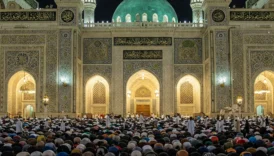Information About Torah, Psalms, And Gospel
Sacred texts revealed to Prophets Moses, David, and Jesus hold divine guidance. They emphasize monotheism, morality, and salvation. Discover their significance in Islam, their original purity, and the respect Muslims hold for them.
- Information About Torah, Psalms, And Gospel
- What Is The Torah
- What Is The Psalms
- What Is The Gospel
- Their Place In Islam
- Important Information In The Sources
- Historical Process Of The Torah
- Significance Of The Psalms
- Sections Of The Gospel
- Torah, Psalms, And Gospel In Hadith
- Quranic Verses About Previous Scriptures
- Final Word
- References
What Is The Torah
The Torah is believed to have been revealed to Prophet Moses (peace be upon him) as a divine scripture, initially guiding the Children of Israel. In Islamic tradition, the Torah contained religious laws, moral principles, and directives for worship. Muslims hold that its original form was purely from Allah, while certain portions may have been altered over time. This view underscores the Islamic belief that although the Torah’s roots are wholly divine, historical events such as conquests and copying processes potentially led to variations in the transmitted text.
In one Quranic verse, faith in earlier revelations is emphasized:
الَّذِينَ يُؤْمِنُونَ بِمَا أُنْزِلَ إِلَيْكَ وَمَا أُنْزِلَ مِنْ قَبْلِكَ
(Alladhīna yu’minūna bimā unzila ilayka wa mā unzila min qablik)
“Those who believe in what has been revealed to you (O Prophet) and what was revealed before you.” (Al-Baqarah 2:4)
By this verse, Muslims acknowledge that scriptures like the Torah form part of a divine chain of revelation. It indicates an imperative for believers to respect what Allah initially revealed to Prophet Moses (peace be upon him) and to understand that all revealed books share the core principle of monotheism.
What Is The Psalms
The Psalms (Zabur) are understood to have been granted to Prophet David (peace be upon him). In Islamic sources, the Psalms are described as containing prayers, praises, and spiritual reminders, highlighting Prophet David’s deep reverence for the Almighty. They emphasize supplication, sincerity, and devotion to Allah.
About Prophet David’s gifted recitation, a notable narration mentions that mountains would join him in glorification:
وَآتَيْنَا دَاوُودَ زَبُورًا
(Wa ātaynā Dāwūda zabūrā)
“And to David We gave the Psalms.” (An-Nisā’ 4:163)
The hadith literature also points to his beautiful voice that moved both humankind and nature alike (Suyūtī, ed-Durru’l Mensūr). This attests to the elevated spiritual character of the Psalms, encouraging reflection and remembrance of Allah among those who recite them.
What Is The Gospel
The Gospel (Injīl) is believed to have been sent down to Prophet Jesus (peace be upon him), confirming the Torah and elaborating its central teachings. The Quran highlights Prophet Jesus’s (peace be upon him) role in affirming previous scriptures and bringing guidance to his community:
وَقَفَّيْنَا عَلَى آثَارِهِمْ بِعِيسَى ابْنِ مَرْيَمَ مُصَدِّقًا لِمَا بَيْنَ يَدَيْهِ مِنَ التَّوْرَاةِ وَآتَيْنَاهُ الْإِنْجِيلَ
(Wa qaffaynā ‘alā āthārihim bi ‘Īsā bni Maryama muṣaddiqan limā bayna yadayhi mina’t-Tawrāti wa ātaynāhu’l-Injīl)
“And in their footsteps We sent Jesus, son of Mary, confirming the Torah that came before him, and We gave him the Gospel.” (Al-Mā’idah 5:46)
In Islam, the Gospel is perceived as proclaiming the Oneness of Allah, compassion, humility, and devotion. Muslims also hold that sections of the original Gospel were gradually lost or mixed with other narratives over time, leading to variations in the surviving texts.
Their Place In Islam
These scriptures collectively represent divine guidance bestowed upon various communities. Each text addresses the religious and social circumstances of its audience, reinforcing core concepts of Tawḥīd (Oneness of Allah) and accountability in the Hereafter. From an Islamic perspective, the Torah, Psalms, and Gospel were all integral steps on the path culminating in the Qur’an, which Muslims regard as the final, unaltered revelation.
Though Islam teaches that alterations or additions occurred in the earlier scriptures, it calls for respect toward their original substance. Muslims consider these books part of a spiritual heritage, where fundamental moral teachings, like kindness and truthfulness, remain relevant reminders. The Qur’an confirms this in many passages, including:
وَأَنْزَلَ التَّوْرَاةَ وَالْإِنْجِيلَ مِنْ قَبْلُ هُدًى لِلنَّاسِ
(Wa anzala’t-Tawrāta wa’l-Injīla min qablُ hudan li’n-nās)
“He sent down the Torah and the Gospel previously as a guide for humankind.” (Āl ‘Imrān 3:3-4)
Important Information In The Sources
Historical Process Of The Torah
In Jewish tradition, the Torah is organized into five primary sections, collectively referred to as the Pentateuch. Islamic scholars highlight that the Torah has undergone centuries of copying, translations, and possible insertions by scribes. Wars, exiles, and scholarly debates across generations are cited as factors that contributed to the fluid transmission of the text. Islam upholds the belief that Prophet Moses (peace be upon him) indeed received a heavenly scripture, yet continuity of the exact original text is uncertain.
Significance Of The Psalms
The Psalms are known for their lyrical and heartfelt nature, often expressing deep supplications, praises, and themes of repentance. The Islamic understanding appreciates these aspects as reminders of the believer’s duty to continuously remember Allah. Although only fragments may remain in contemporary renditions, the spiritual essence is considered a source of reflection.
Prophet David’s (peace be upon him) devotion is highlighted in various Islamic texts. There is a mention that his recitation would spiritually elevate listeners, influencing hearts to turn toward Almighty Allah in praise and repentance. This dimension portrays the Psalms as a beacon of spiritual intimacy, forging a direct link between the believer’s heart and the divine realm.
Sections Of The Gospel
Modern Christian tradition includes four canonical Gospels (Matthew, Mark, Luke, and John), along with additional writings such as epistles and commentaries by early theologians. From an Islamic standpoint, Prophet Jesus (peace be upon him) was given one divine revelation, the Injīl. Over time, various authors documented the teachings and events surrounding his ministry. However, divergent viewpoints and textual variations emerged.
Islamic scholars interpret these differences as signs of textual change, suggesting that the pure, original Gospel proclaimed God’s Oneness and exemplified piety, compassion, and righteous living. This perspective aligns with the overarching message of all prophets, which is unwavering devotion to Allah.
Torah, Psalms, And Gospel In Hadith
Prophet Muhammad (peace be upon him) counseled Muslims regarding earlier scriptures in a balanced manner. Authentic narrations convey statements along the lines of “Neither confirm nor deny them,” indicating that some truths remain intact while other parts may be suspect (Bukhārī, I’tisām). Muslims are thus encouraged to weigh content against the Quran, which is considered the ultimate criterion and guardian over previous revelations:
وَمُهَيْمِنًا عَلَيْهِ
(Wa muhayminan ‘alayhi)
“And as a protector (muhaymin) over it.” (Al-Mā’idah 5:48)
This verse portrays the Quran as the final arbiter, safeguarding the core message that unites all prophets: worship of the One Creator and steadfast commitment to righteousness.
Quranic Verses About Previous Scriptures
Several Quranic passages refer to these venerable books with profound reverence. By examining their content through the lens of the Quran, Muslims strive to preserve the legacy of divinely inspired teachings without endorsing subsequent modifications. Indeed, the notion that all prophets conveyed the same call—to acknowledge Allah alone—is intrinsic to the faith of Islam.
As an example, in the Quran we read:
وَالَّذِينَ يُؤْمِنُونَ بِالْآخِرَةِ يُؤْمِنُونَ بِهِ
(Wa alladhīna yu’minūna bi’l-ākhirati yu’minūna bihi)
“And those who believe in the Hereafter believe in it.” (Al-An‘ām 6:92)
Islamic exegetes comment that believing in the continuity of divine revelation across history is part of affirming faith in both the spiritual world and the ultimate Day of Reckoning.
Final Word
From the Islamic perspective, Torah, Psalms, and Gospel were indeed sent down from Allah to Moses, David, and Jesus (peace be upon them all). Despite the textual changes perceived to have taken place over generations, Muslims maintain a respectful stance towards their divine origins. At the heart of each scripture is the message of Tawḥīd—an unwavering acknowledgment of the One Creator—along with moral directives that call for justice, compassion, and devotion.
Ultimately, Islam teaches that the Quran completes and perfects the sequence of revelations. Nonetheless, Muslims appreciate the earlier books for their initial role in guiding people to the truth. The commitment to all prophets and their teachings forms a fundamental aspect of Islamic faith, exemplifying unity and reverence for divine instruction.
References
- Bukhārī, I’tisām
- Suyūtī, ed-Durru’l Mensur
- Rāzī Tafsir
- Qurtubī Tafsir
- Ibn Kathīr Tafsir
- Tabarī Tafsir
- Muslim, Book of Īmān
- Bukhārī, Anbiyā’





